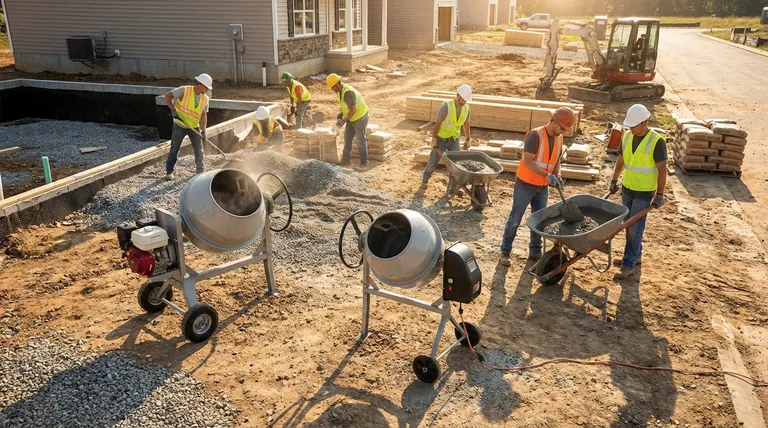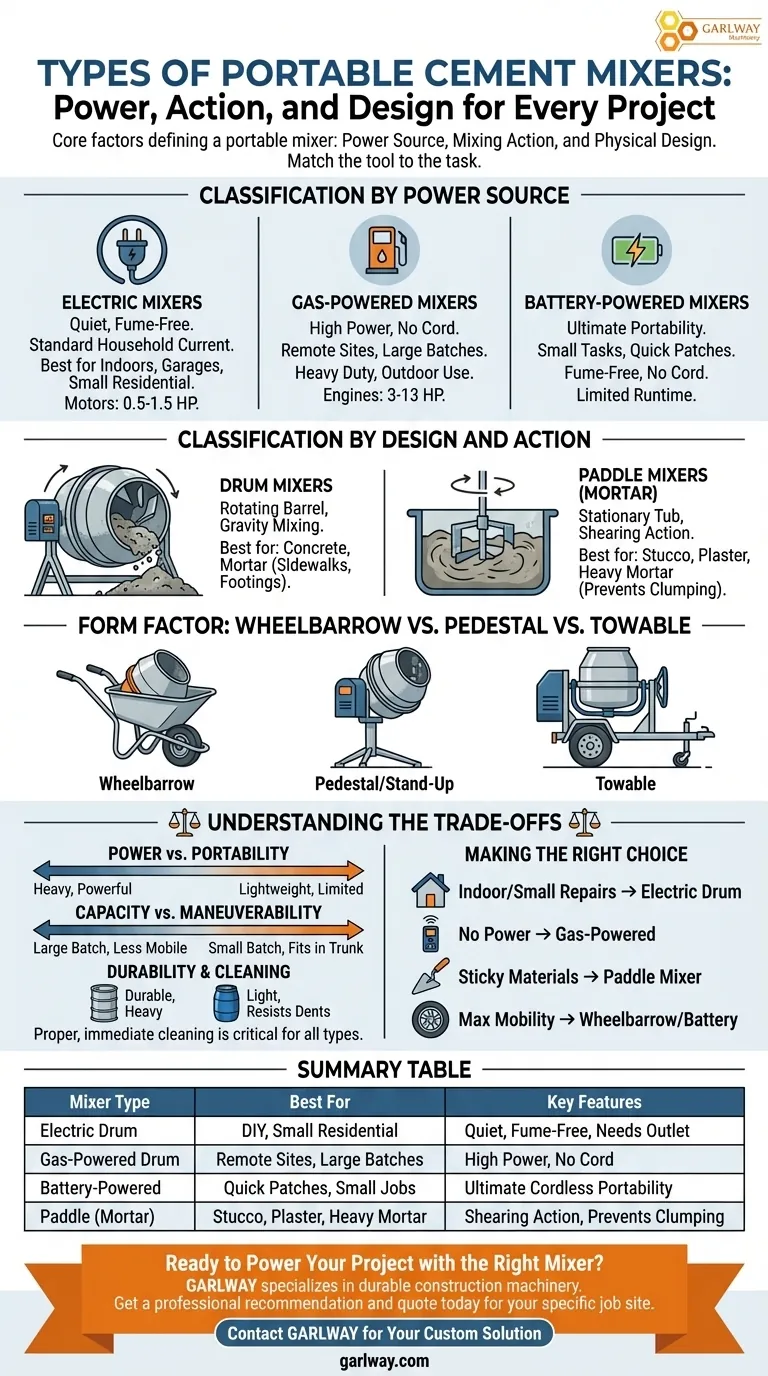At its core, a portable cement mixer is defined by its power source, mixing action, and physical design. The main types available are electric, gas-powered, or battery-powered drum mixers, with specialized paddle mixers available for stickier materials like mortar or stucco. These models come in various sizes and styles, from small wheelbarrow designs to larger, towable units.
Your choice of mixer is not about finding the "best" one, but about matching the tool to the task. The right mixer depends entirely on your project's location, scale, and the specific material you need to combine.

Classification by Power Source
The power source is the most critical factor determining where and how you can work. It dictates your mobility, power output, and the acceptable working environment.
Electric Mixers
Electric mixers are the most common choice for DIY and small residential projects. They run on standard household current, making them convenient for use in garages, basements, or yards with access to an outlet.
These models, typically with motors from 0.5 to 1.5 horsepower, are significantly quieter than gas engines and produce no fumes, making them the only viable option for indoor work.
Gas-Powered Mixers
For job sites without electricity, a gas-powered mixer is essential. Their engines are more powerful, ranging from 3 to 13 horsepower, allowing them to handle larger, stiffer batches of concrete with ease.
This power comes at the cost of noise, exhaust fumes, and increased weight. They are the workhorses for remote projects like foundations, large slabs, or fence lines far from a power source.
Battery-Powered Mixers
A growing category, battery-powered mixers offer the ultimate in portability for very small tasks. They provide the fume-free operation of electric models without being tethered to a cord.
However, they are limited by battery runtime and are best suited for quick patches, setting a few posts, or mixing small batches of grout where convenience is the top priority.
Classification by Design and Action
How a mixer is built and how it physically combines materials determines its suitability for different substances and job site logistics.
Drum Mixers
This is the classic design most people picture: a rotating barrel (or drum) that tumbles the material. Angled fins inside the drum lift and drop the aggregate, sand, cement, and water, relying on gravity to do the mixing.
Drum mixers are excellent all-rounders, perfect for mixing concrete and mortar for projects like sidewalks, small foundations, and footings.
Paddle Mixers (Mortar Mixers)
Instead of a rotating drum, these mixers use a stationary tub and a set of rotating paddles to churn the material. This design provides a more forceful, shearing action.
This makes paddle mixers superior for "sticky" materials like stucco, plaster, or heavy mortar, which can clump together and stick to the sides of a traditional drum mixer.
Form Factor: Wheelbarrow vs. Pedestal vs. Towable
Portable mixers are built in several styles. Wheelbarrow models have integrated wheels and handles, allowing one person to easily move them around a job site.
Pedestal or stand-up models are more stationary. Towable mixers are the largest class of portable units, built on an axle with a trailer tongue for transport by a vehicle to larger projects.
Understanding the Trade-offs
Choosing the right mixer involves balancing competing factors. Being aware of these compromises is key to avoiding frustration.
Power vs. Portability
A powerful gas engine can mix anything you throw at it, but it's heavy and difficult to move. A lightweight electric model is easy to transport but is limited by cord length and lower power.
Capacity vs. Maneuverability
A larger drum capacity (measured in cubic feet) means you mix fewer batches, saving time on big jobs. However, a 9-cubic-foot mixer is far less maneuverable than a 3-cubic-foot model you can fit in a car trunk.
Durability and Ease of Cleaning
Steel drums offer maximum durability against abrasion but are heavy. Polyethylene drums are lighter and resist dents, but can be less rigid. Regardless of material, proper and immediate cleaning is critical to prevent hardened concrete from ruining the machine.
Making the Right Choice for Your Project
Use your primary goal to guide your selection.
- If your primary focus is indoor work or small repairs: Choose a quiet, fume-free electric drum mixer.
- If your primary focus is work on a remote site without power: A gas-powered mixer is your only reliable option.
- If your primary focus is mixing heavy mortar, stucco, or plaster: A paddle mixer will provide better consistency and save you time.
- If your primary focus is maximum mobility for small patch jobs: A compact wheelbarrow-style or battery-powered mixer offers the most convenience.
Selecting the right portable mixer ensures your project runs smoothly from the very first pour.
Summary Table:
| Mixer Type | Best For | Key Features |
|---|---|---|
| Electric Drum | DIY, small residential jobs | Quiet, fume-free, needs outlet |
| Gas-Powered Drum | Remote sites, large batches | High power, no cord needed |
| Battery-Powered | Quick patches, small jobs | Ultimate cordless portability |
| Paddle (Mortar) | Stucco, plaster, heavy mortar | Shearing action, prevents clumping |
Ready to Power Your Project with the Right Mixer?
Choosing the correct portable cement mixer is critical for efficiency and results. GARLWAY specializes in durable construction machinery, including a range of winches, concrete mixers, and batching plants designed for the demanding needs of construction companies and contractors worldwide.
Let our experts help you select the ideal mixer for your specific job site requirements, material, and scale. Get a professional recommendation and quote today to ensure your next project is a success from the ground up.
Contact GARLWAY for Your Custom Solution
Visual Guide

Related Products
- Commercial Electric Concrete Mixer Machine HZS 50 Small Batch Plant for Sale
- Portable Electric Concrete Mixer Machine for Cement Mixing
- Ready Mixer Machine for Construction Ready Mix Machinery
- Portable Concrete Mixer Machine Equipment for Mixing Concrete
- Commercial Construction Mixer Machine for Soil Cement Mixing Concrete
People Also Ask
- How are the material compartments sized in volumetric mixers? Optimized for Standard Concrete Recipes
- What are the advantages of portable concrete mixers? Achieve On-Site Flexibility and Cost Control
- What is a mini mixer used for? The Ultimate Tool for Small-Scale Concrete & Mortar
- What should be considered when choosing a portable cement mixer? Find the Perfect Fit for Your Project
- What are the primary benefits of using on-site concrete mixers? Gain Control, Cut Costs, and Boost Efficiency
- What types of portable concrete mixers exist? Find the Perfect Mixer for Your Project
- How do mobile mixers contribute to cost savings in construction? Slash Costs with On-Site Mixing
- What are the different names for mobile concrete mixing equipment? Understand Volumetric vs. On-Site Mixers


















